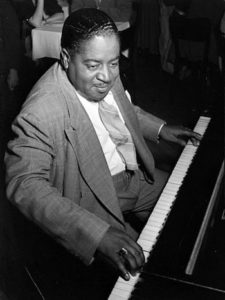
Pete Johnson
*Pete Johnson was born on this date in 1904. He was a Black boogie-woogie and jazz pianist.
Kermit H. Johnson (his birth name) was born in Kansas City, Missouri. His mother raised him after his father deserted the family. When he was three, he was placed in an orphanage, becoming homesick. However, he ran away and returned to living at home. By 12, he sought work to ease some of the financial burdens at home. He worked various jobs in a factory, a print shop, and shining shoes. He dropped out of school in the fifth grade.
Johnson began his musical career in 1922 as a drummer in Kansas City. He began playing the piano about the same time he was learning the drums. His early piano practices took place in a church, and he worked as a water boy for a construction company. From 1926 to 1938, he played the piano, often working with Big Joe Turner.
An encounter with record producer John Hammond in 1936 led to an engagement at the Famous Door in New York City. 1938, Johnson and Turner appeared in the From Spirituals to Swing concert at Carnegie Hall. After this show, the popularity of the boogie-woogie style was on the upswing. Johnson worked locally and toured and recorded with Turner, Meade Lux Lewis, and Albert Ammons during this period.
Lewis, Ammons, and Johnson appeared in the film short Boogie-Woogie Dream in 1941. The song "Roll 'Em Pete" (composed by Johnson and Turner), featuring Turner on vocals and Johnson on piano, was one of the first rock and roll records. Another self-referential title was their "Johnson and Turner Blues." In 1949, he also wrote and recorded "Rocket 88 Boogie," a two-sided instrumental, which influenced the 1951 Ike Turner hit, "Rocket 88". On three dates in January 1946, Johnson recorded an early concept album, House Rent Party. In 1950, he moved to Buffalo, where he encountered health and financial problems, including losing part of a finger in an accident and being partially paralyzed by a stroke.
In 1953, he washed trucks and supplemented his income by performing in a trio that played at the Bamboo Room in Buffalo on weekends. Johnson experienced more of the same the following year. In July 1954, he played at the St. Louis Forest Park Hotel, a six-week engagement as a resident pianist at the Circus Snack Bar. In a Saturday at the Chase program, some broadcasts were made on Saturday afternoons. Johnson was also privately recorded on July 20 and August 1 at two house parties arranged at the home of a close friend. He continued to record and toured Europe in 1958 with the Jazz at the Philharmonic Ensemble.
While in Europe, he was invited to appear at the Newport Jazz Festival, accompanying Big Joe Turner, Chuck Berry, and Big Maybelle. Johnson developed a heart condition as well as diabetes. Several strokes followed, resulting in a complete loss of mobility in both hands. Four years after the series of strokes, he was still disabled and was beginning to lose his eyesight. Jazz Report magazine ran a series of record auctions to raise money for Johnson.
In 1964, Hans Maurer, a longtime correspondent of his, published The Pete Johnson Story. All sales proceeds went to Johnson. After an article in a 1964 issue of Blues Unlimited detailing Johnson's difficulty receiving royalty payments other than from Blue Note and Victor, in June, Johnson was accepted as a member of ASCAP, which finally ensured that some of the royalties would be received regularly.
His final live appearance was the Spirituals to Swing concert at Carnegie Hall in 1967, his eighth and final appearance at this event. His old buddy, Turner, took him by the hand, and for a moment, the two middle-aged men looked touchingly like little boys. Johnson was a bit shaky but game, gaining in confidence as the number built in intensity." Pete Johnson died two months later in Meyer Hospital, Buffalo, New York, on March 23, 1967, at 62.